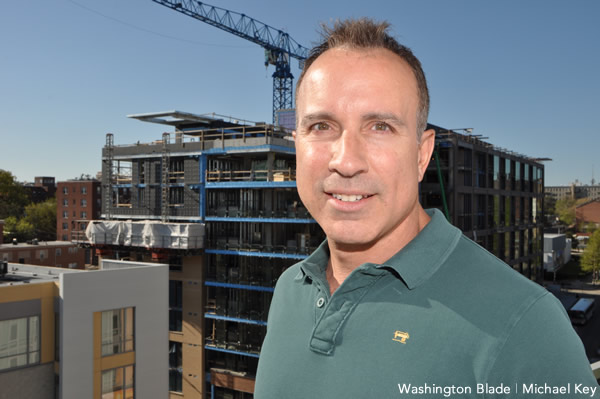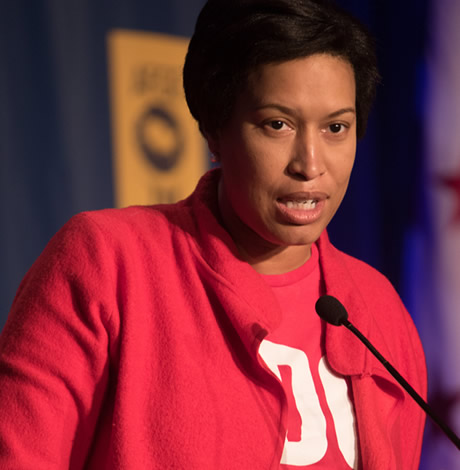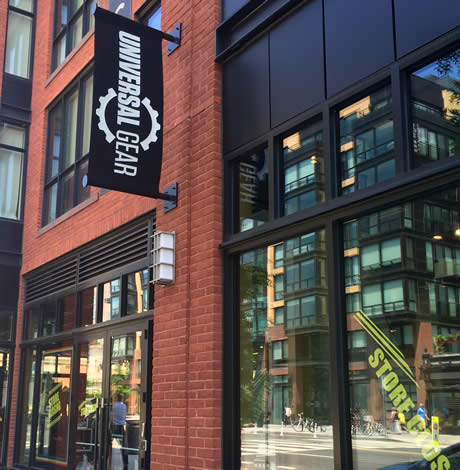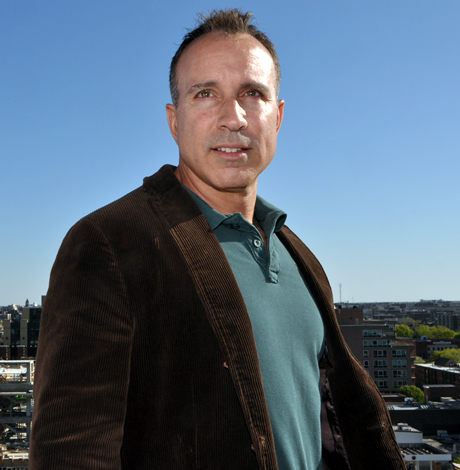Living
Helping transform city’s living landscape
Developer, Universal Gear owner Franco puts his passions to work
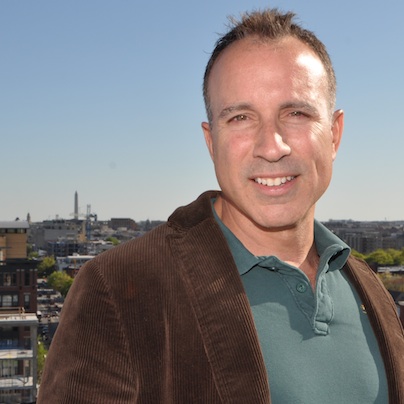
Last week was the anniversary of the 1968 riots in D.C., following the assassination of Dr. Martin Luther King, Jr., in Memphis. The ensuing five days of destruction that befell Washington and filled the sky with smoke scarred the city’s landscape for decades and cut a hole in the heart of commerce through the prominent local retail districts of the era.
Washington neighborhoods hollowed out by looting and fires are only now beginning to fully finish recovering as commercial and residential real estate development repurposes the remaining empty buildings and reconstructs many of the last vacant lots across a wide swath of the city. Nowhere has this transformation been more dramatic than along the 14th Street, N.W., commercial corridor, as it intersects with U Street and stretches northward into Columbia Heights.
It is in this area that long-time community entrepreneur and local businessman and real estate developer David Franco continues to have a significant impact on a still rapidly evolving landscape. Uppermost in his mind has been this guiding principle: “How can I impact the community by creating a positive environment and contribute effective change in a concentrated area?”
A Washington-area native and lifelong resident, Franco recalls his father vividly detailing the riots of 44 years ago. Now 47, he remembers the pride and gratitude in the recounting of customers driving to the family-owned clothing store in downtown Washington at 12th and G streets, now a Macy’s department store in the former Hecht’s building, to stand in front waving on potential looters. Appreciative of the years of dedicated customer service conveyed to generations of families, “not this place” they implored in defending the business. The store remained untouched throughout the extended melee of anger and frustration.
Franco grew up understanding firsthand the importance of providing attentive and personalized customer service and engendering this type of loyalty. He would later infuse his own business activities with building relationships in the marketplace. A strong sense of ethics, a spirit of community-mindedness and dedication to the client experience and product provided were to become the trademarks of his future endeavors.
Following a three-year stint at the University of Maryland where he studied architecture, business and urban affairs, Franco continued working with the family enterprise, a successful local chain of discount department stores, until 1989. It was then that he became one of the investors backing the management team at the iconic nightclub Tracks that would dominate the gay dance scene through the next decade. He also partnered with the group in opening Trumpets restaurant and lounge on the 17th Street dining and entertainment strip near Dupont Circle.
Soon after, during the April 1993 weekend of the national March on Washington for Lesbian, Gay and Bi Equal Rights and Liberation, Franco would launch a clothing and accessories store with then business partner and commercial interior designer Keith Clark.
Universal Gear, located above Trumpets in a street level retail space at the corner of 17th and Q streets, quickly skyrocketed in popularity, outfitting many a gay man casually attired for work, play or the gym. The store would soon expand into a second level, nearly doubling in size with a complete interior renovation and striking new layout.
Franco would later explore market opportunities with since discontinued stores in Atlanta and Chicago’s Boystown, as well as opening a thriving Manhattan store in the heart of Chelsea and another in Rehoboth Beach. Universal Gear is adding a second New York location early next month in the trendy Hell’s Kitchen midtown west neighborhood at 9th Avenue and 49th Street.
In tandem with his development activities in the 14th and U area and following his customer base eastward, the local Universal Gear relocated to 14th and P streets in November 2007, becoming an expansive new neighborhood retail anchor.
Franco had earlier discovered that his passion for architecture and urban planning would lead him to residential real estate development, first renovating and marketing a 12-unit condo building on Chapin Street in Columbia Heights with business partner Jeff Blum, with whom he co-founded Level 2 Development. Excited by the then-booming pre-recession housing market, they started looking around for additional opportunities and set their sights on developing a larger project.
A Scorpio, Franco admits to “loving a challenge.”
This led Franco and Blum to undertake one of the largest and most prominent residential development projects along 14th Street.
Located at Florida Avenue and standing as the gateway at the sloping incline into adjoining Columbia Heights, the massive View 14 building and its 185 rental units and 30,000 sq. ft. of ground floor retail space – replacing an auto repair garage and an unattractive array of satellite dishes and communication towers – became a harbinger and symbol of extensive change in the area. David calls one of the penthouse units with a south-facing pinnacle terrace overlooking the area home.
Construction cranes are once again jutting into the sky along the high-density thoroughfare. The outline of a large glass-clad apartment building across the street from View 14, originally designed by Level 2 and subsequently sold to another firm for construction following initial planning, is quickly progressing toward completion.
Level 2 Development will next begin construction of a 144-unit studio and one-bedroom apartment project on 14th Street at Wallach Place, only steps south of U Street. Groundbreaking for the yet to be named project, located at 1919 14th St., will signal the Level 2 duo’s next project in the District, undertaken in association with Keener-Squire Properties.
The long road to project approval was not an easy one, according to Franco. He compares the process to the infamously cumbersome regulatory obstacles experienced by restaurant and bar owners under the city’s liquor licensing regimen.
Acknowledging that some neighborhood residents are often skeptical regardless of the track record of a local business, he notes that an “overabundant sense of empowerment” by small numbers of frequently ill-informed neighborhood opponents of change and small citizens groups requires advance calculation of the substantial expense for both hard and soft costs related to project delays and extensive round-robin negotiations. This results in higher rental or sale prices and can endanger project viability.
Underscoring how challenging a place the District can be to conduct business, Franco longs for local entrepreneurs to be respected as shared stakeholders. He points out that better cooperation would yield greater benefits for all.
Franco does not hesitate to confirm that a new ethos has taken hold for housing construction and resident lifestyles in the most vibrant and developing areas of the city. “We’re betting the ranch on it,” he offers, describing a distinct consumer preference for smaller home environs with modern finishes and amenities designed for a diverse demography drawn to a life largely experienced outside the front door.
“That’s how we live now,” he adds, identifying retail stores and shops of all types, dining and entertainment destinations and social watering holes as current interactive magnets and contemporary gathering places. Franco points out that demand for such community spots will likely continue to outpace capacity as the area – already experiencing the city’s greatest growth and a dramatic recent double-digit percentage population increase – adds more than 3,000 new residents in the next year.
Despite the business hurdles and regulatory obstacles, Franco remains committed to pursuing additional projects and public/private partnerships with and in the city he loves and lives. Enlivened by the development process and passionate about the results is what continues to motivate and inspire his efforts to play an ongoing role in the creation of a livable and engaging urban environment.
Mark Lee is a local small business manager and long-time community business advocate. Reach him at [email protected].
Autos
Sporty sedans: BMW 530i xDrive, Mercedes AMG CLA 3
Tariffs are here and the result is financial chaos
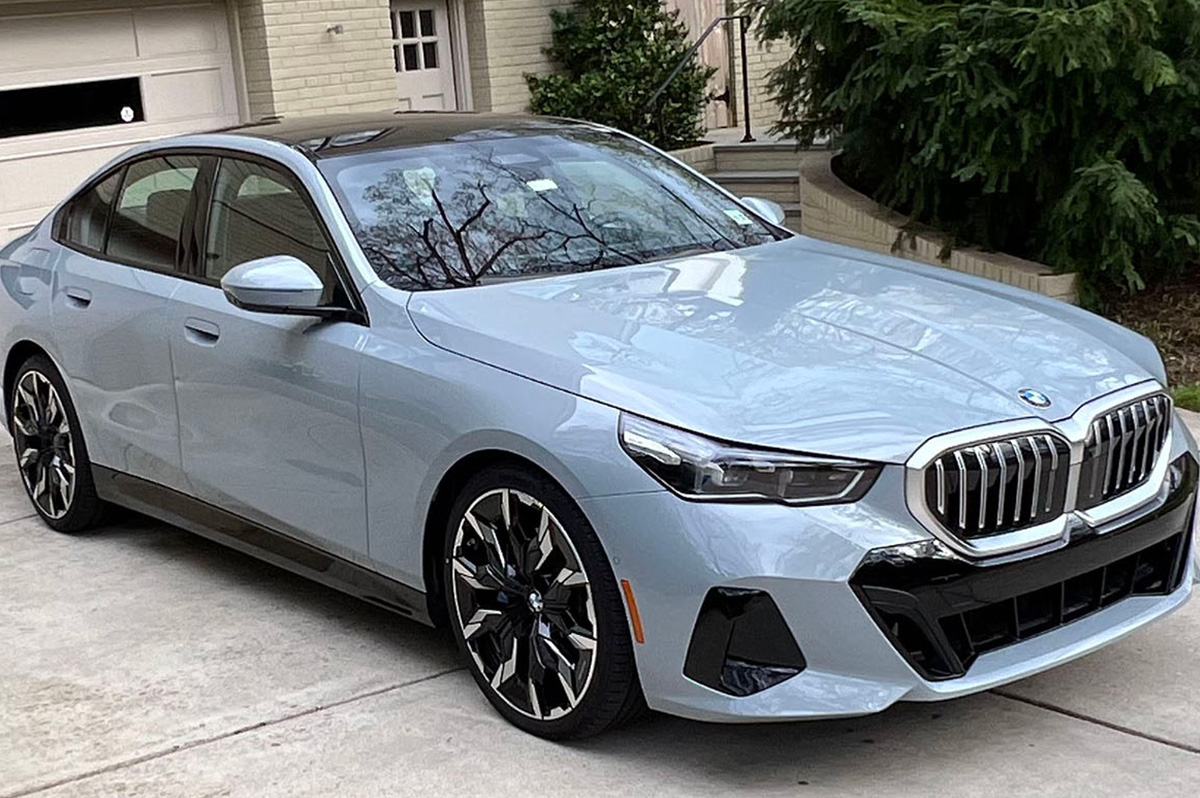
It’s official: Tariffs are here, and the result is financial chaos.
So, what to do when purchasing a new vehicle? If you need one in the not-so-distant future, buy sooner (like yesterday) rather than later. Expect prices to rise quickly, as inventory dwindles, demand soars, and automaker incentives evaporate. Of course, if a new ride isn’t a priority for at least a year or three, then hold off until the dust settles.
But for those of you looking for new wheels now, I recently drove two sport sedans that were a pleasant reprieve from the usual plethora of pickups, minivans, and SUVs.
BMW 530i xDRIVE
$63,000
MPG: 28 city/35 highway
0 to 60 mph: 5.5 seconds
Cargo space: 18.4 cu. ft.
PROS: Rakish looks. Race-car vibe. Rock-star amenities.
CONS: Rad-but-quirky infotainment system. Rich price.
IN A NUTSHELL: Classic good looks, from the iconic grille and swept-back headlights to chiseled side panels and a tasteful tush. For a gearhead like me, the BMW 530i xDrive — completely redesigned last year — is as rapturous as Michelangelo’s David. Everything here is in proportion, from the design to the drivetrain, which — along with a gutsy 255-hp turbo and all-wheel drive — helps deliver a divine experience behind the wheel. Even better, my test car came equipped with the heavenly M-Sport Package: 21-inch wheels, athletic suspension, and assorted styling upgrades.
A tech-laden cabin is outfitted with a sparkly 12.3-inch digital instrument cluster and 14.9-inch touchscreen infotainment system. With the windshield head-up display and a slew of knobs and toggle switches in the center console and on the steering wheel, I wondered if this is how it feels to pilot the Space Shuttle. There is even a back-lit interaction bar with touch-sensitive controls to adjust vent direction and other climate control settings.
All this gadgetry takes some getting used to, but the overall effect is dazzling. While a 12-speaker Harman Kardon stereo comes standard, I was jammin’ to the 16-speaker Bowers & Wilkins premium audio. Of course, such options add up quickly (on my test car, the extras totaled $13,000).
Just how fun is this car? In my favorite episode of “Hacks,” sassy Jean Smart drives a rockin’ Rolls Royce Wraith. Trust me, this four-door BMW is every bit the badass as that $300,000 super coupe.
MERCEDES AMG CLA 35
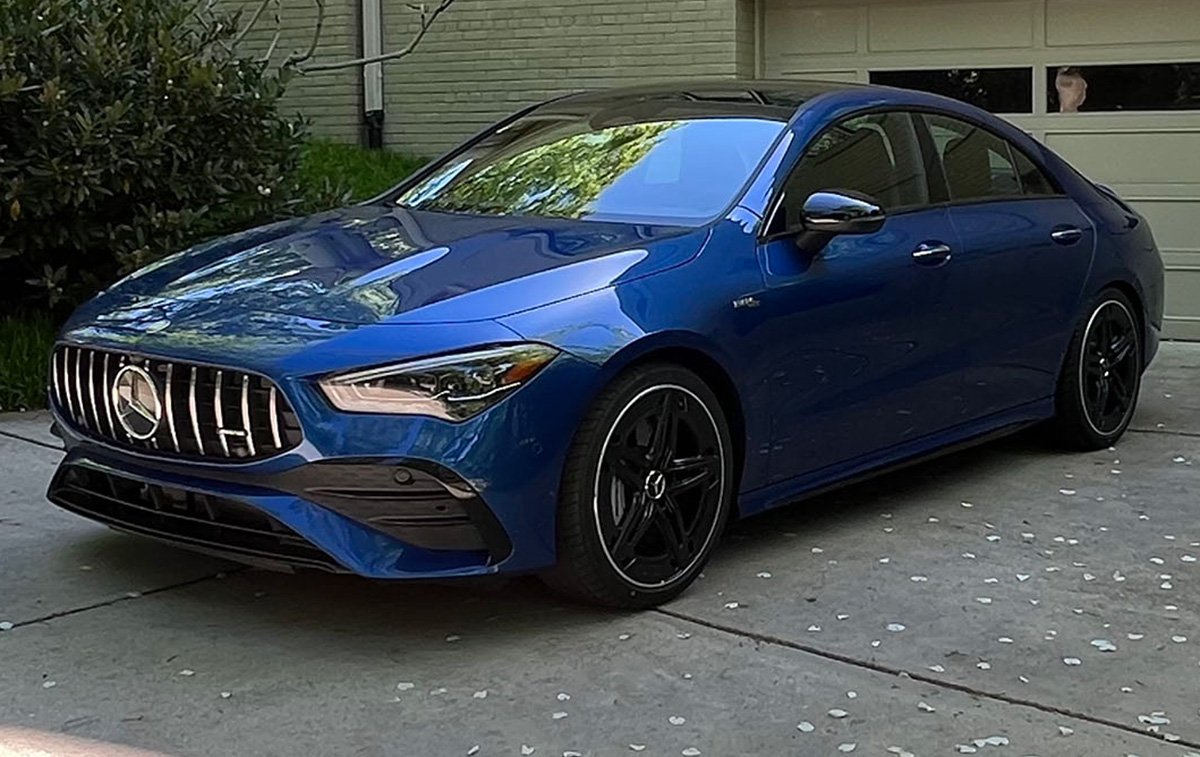
$58,000
MPG: 22 city/29 highway
0 to 60 mph: 4.8 seconds
Cargo space: 11.6 cu. ft.
PROS: Slick styling. Spiffy cabin. Sublime seats.
CONS: Smallish trunk. So-so rear headroom and legroom.
IN A NUTSHELL: Need a smaller sedan that’s just as marvy as the midsize BMW i530? Look no further than the compact Mercedes CLA-Class, which is 14 inches shorter. That’s a benefit when jockeying for parking or navigating rush hour.
Another plus: This is Mercedes’s least expensive sedan, available in three trim levels. All come with the same potent turbo but in varying power levels. The base model starts at $46,000, but I tested the first of two high-performance versions: the AMG CLA 35, which costs $12,000 more. You can open your wallet even further to snag the $67,000 AMG CLA 45.
But why bother? The AMG CLA 35 is plenty quick — faster than the BMW i530 — and boasts sport-tuned brakes, deft handling and a gritty-sounding exhaust system. The laundry list of standard features includes all-wheel drive, automated parking, gobs of the latest safety gizmos and even something called “safe-exit assist,” which prevents passengers from opening a door into traffic or speeding cyclists.
The interior is pure Mercedes, with top-notch materials, customizable ambient lighting and Burmester surround-sound audio. The overall layout—sleek and modern, but with elegant stitching in the seats and on the door panels and dashboard—is comfortable and user-friendly. Digital displays and touchscreens are similar to what’s in the BMW i530, just smaller.
Size matters, of course, which is why this vehicle’s shorter length can be a blessing but also a curse, especially when trying to squeeze passengers with longer legs into the backseats. And the dramatically sloped roofline, attractive from the outside, limits the amount of rear headroom and cargo space. Thank the automotive gods for panoramic sunroofs, which—at least for anyone in the front seats—makes this cabin feel surprisingly spacious.
Real Estate
Spring updates to sell your home for pride and profit
Consider new landscaping, power washing, creative staging

Selling a home is a big deal for anyone, but for members of the LGBTQ+ community, it comes with unique considerations—from finding affirming professionals to ensuring your home is represented in a way that reflects your values. Whether you’re a first-time gay home seller or a seasoned LGBTQ+ homeowner looking to move up, maximizing your home’s value is key to a successful and empowering sale.
Here’s how to prepare your home, your mindset, and your real estate strategy to get the most value—financially and emotionally—from your home sale.
1. Start with an LGBTQ+-Friendly Real Estate Agent
Before diving into renovations or staging, make sure your agent truly understands your needs. A gay-friendly or LGBTQ+-affirming real estate agent brings more than just market expertise—they bring cultural competence, safety awareness, and a network that supports you throughout the selling process.
At GayRealEstate.com, you can find experienced, vetted LGBTQ+ real estate agents who have been proudly serving the community for over 30 years. Working with someone who shares or supports your identity ensures your selling journey is respectful, inclusive, and effective.
2. Enhance Curb Appeal—With a Welcoming Vibe
The outside of your home is the first impression a potential buyer gets. Make it count—especially for LGBTQ+ buyers looking for a home that feels safe and welcoming.
- Fresh landscaping: Add colorful flowers, neatly trimmed shrubs, or low-maintenance greenery to appeal to eco-conscious buyers.
- Update the entrance: A new front door, stylish lighting, or even a rainbow doormat can make your home feel like a safe space from the start.
- Clean and repair: Power wash the exterior, touch up paint, and make any necessary repairs to gutters, windows, or siding.
3. Stage with Intention and Inclusivity
Home staging can add thousands to your sale price. But beyond the usual decluttering and neutral palettes, think about how your space tells a story—and who it’s telling it to.
- Create a warm, inclusive feel: Subtle touches like LGBTQ+ art, books, or even coffee table magazines can show off your personality and affirm the space for queer buyers.
- Depersonalize—but don’t erase: You don’t need to hide your identity to appeal to buyers. Let your home feel lived in and loved—while still being a blank canvas others can imagine themselves in.
- Highlight multi-use areas: Home offices, gender-neutral nurseries, or flex spaces resonate with LGBTQ+ families and professionals.
4. Update Kitchens and Bathrooms Strategically
These rooms matter most to buyers—and even small updates can yield big returns.
- Kitchen: New cabinet hardware, a fresh backsplash, and modern lighting can elevate the entire room without a full remodel.
- Bathroom: Replace old fixtures, re-caulk tubs and sinks, and add plush towels and inclusive décor.
- Energy-efficient upgrades: Touchless faucets, smart appliances, or low-flow toilets are not only trendy—they signal sustainability, which matters to LGBTQ+ buyers.
5. Make Your Home More Energy Efficient
LGBTQ+ homebuyers often prioritize sustainability. These updates not only reduce energy bills but make your home more marketable.
- Install a smart thermostat (like Nest or Ecobee)
- Upgrade insulation or windows
- Consider solar panels (especially in sun-drenched regions like California or Florida)
Bonus: You may qualify for state or federal tax credits, which can be a great selling point.
6. Know and Advocate for LGBTQ+ Housing Rights
Although housing discrimination is illegal under the Fair Housing Act, it still happens. As an LGBTQ+ seller, be aware of your rights—and those of potential buyers.
- Avoid steering or bias: Even with good intentions, make sure you’re not inadvertently influencing who views or buys your home based on identity.
- Work with affirming professionals: From inspectors to lenders, choose partners who support inclusive practices.
- Report discrimination: If you or a buyer encounters bias, report it to HUD or your local housing authority.
7. Price Your Home Right—and Market It Smartly
Setting the right price is essential to maximizing value. Your LGBTQ+-friendly agent can run a comparative market analysis, considering current trends and buyer demographics.
- Leverage LGBTQ+ real estate networks: Promote your home through platforms like GayRealEstate.com to reach an audience that understands and values your space.
- Use inclusive language in listings: Avoid gendered terms or heteronormative assumptions. Instead of “his and hers closets,” use “dual walk-ins” or “double closets.”
- High-quality photos and video tours: Showcase your home with professional, visually inclusive marketing that appeals to diverse buyers.
8. Consider Timing and Local LGBTQ+ Trends
Selling during WorldPride or just before local LGBTQ+ events may boost visibility. Also consider if you’re in or near an LGBTQ+ friendly city or neighborhood.
Not sure which areas are top destinations? GayRelocation.com tracks and shares the best cities for LGBTQ+ homebuyers, helping you tap into motivated buyers.
Final Thought: Sell with Confidence—and Community
Selling your home isn’t just about getting top dollar—it’s about closing a chapter with pride and integrity. When you center your values, work with LGBTQ+ affirming experts, and prepare your home with purpose, you’re not just maximizing your home’s value—you’re creating an empowering experience for yourself and the next owner.
Whether you’re buying, selling, or both—GayRealEstate.com is your trusted partner in every step of your journey. With a nationwide network of gay and lesbian realtors, decades of experience, and deep community ties, we ensure your home transition is safe, smart, and full of pride.
GayRealEstate.com is the nation’s leading online platform connecting LGBTQ+ home buyers and sellers with LGBTQ+ friendly real estate agents, ensuring a safe and supportive experience.
Scott Helms is president of GayRealEstate.com. To find an agent or learn more, visit GayRealEstate.com, GayRelocation.com or call 1-888-420-MOVE.
Real Estate
Navigating DMV real estate market during political unrest
Reductions in federal employment have introduced uncertainties

The Washington, D.C.-Maryland-Virginia (DMV) region has long been recognized for its robust housing market, underpinned by the presence of the federal government and a diverse economic landscape. Recent massive reductions in federal employment have introduced uncertainties, yet the area continues to offer compelling reasons for prospective homebuyers, particularly within diverse communities.
While the federal government has traditionally been a significant employer in the DMV, the region has proactively diversified its economic base. Sectors such as technology, professional services, education, and healthcare have expanded, mitigating the impact of federal job cuts. This diversification fosters some economic resilience, which offers our area a semblance of protection against the impending unknowns that we currently face. Nothing can shield real estate entirely; however, our area tends to survive these types of changes better than other parts of the country.
Despite concerns over federal layoffs, the DMV housing market has demonstrated notable stability. Analyses indicate that the number of active listings, sold properties, and median sales prices have remained steady on a year-over-year basis. This steadiness suggests that the market is adapting to changes without significant disruption.
Furthermore, while there has been a slight increase in home listings, this trend aligns with typical seasonal variations and does not solely reflect federal employment changes. The luxury property segment, in particular, continues to thrive, indicating sustained interest and investment in the region.
The DMV region is renowned for its cultural and demographic diversity, with areas like Montgomery County, Md., being among the most ethnically diverse in the nation. This inclusivity extends to various communities, including LGBTQ individuals, fostering a welcoming environment that enhances the area’s appeal. Even though the current administration is fostering anti-diversity ideology, I remain confident that our LGBTQ community will continue to thrive even as these destructive forces work against us.
Local governments within the DMV have implemented policies aimed at promoting affordable housing and preventing displacement, particularly in the wake of economic shifts. Initiatives like the Douglass Community Land Trust in Washington, D.C., exemplify efforts to maintain housing affordability and support community stability.
Additionally, jurisdictions such as Montgomery County have longstanding Moderately Priced Dwelling Unit (MPDU) programs that require developers to include affordable housing in new residential developments. These policies contribute to socioeconomically mixed neighborhoods, benefiting diverse populations.
Despite Elon Musk’s brandishing of a chainsaw to the federal workforce, our real estate market continues to thrive. The DMV region maintains its appeal. Economic diversification, market stability, commitment to diversity and inclusion, and progressive housing policies collectively contribute to an environment that supports and attracts diverse communities. Prospective homebuyers can find reassurance in the region’s resilience and ongoing efforts to foster an inclusive and vibrant community. These are only a few among the many reasons to have a positive outlook while considering real estate options in our area.
It is important to consider working with brokerages, brokers, agents, lenders and title companies who align with our community and our objectives. Not all LGBTQ agents work for brokerages that support or understand the needs of the members of our community. Do your research and find out who has donated money to what political causes. Now more than ever we must support members of our community to protect our way of life and our very existence.
Stacey Williams-Zeiger is president/principal broker of Zeiger Realty Inc. Reach her at [email protected].
-

 Obituary4 days ago
Obituary4 days agoLocal attorney, LGBTQ rights advocate Dale Sanders dies at 75
-

 U.S. Federal Courts3 days ago
U.S. Federal Courts3 days agoFederal judge blocks Trump passport executive order
-

 Mexico4 days ago
Mexico4 days agoGay couple claims Puerto Vallarta wedding venue discriminated against them
-

 Books3 days ago
Books3 days ago‘Pronoun Trouble’ reminds us that punctuation matters

